Ketchup is the classic condiment, but in modern times it has strayed wildly from what it once was. The good news is that homemade ketchup is actually quite healthy, and when it’s fermented even more so. Plus, it’s super easy to make! Here’s how to make fermented ketchup.
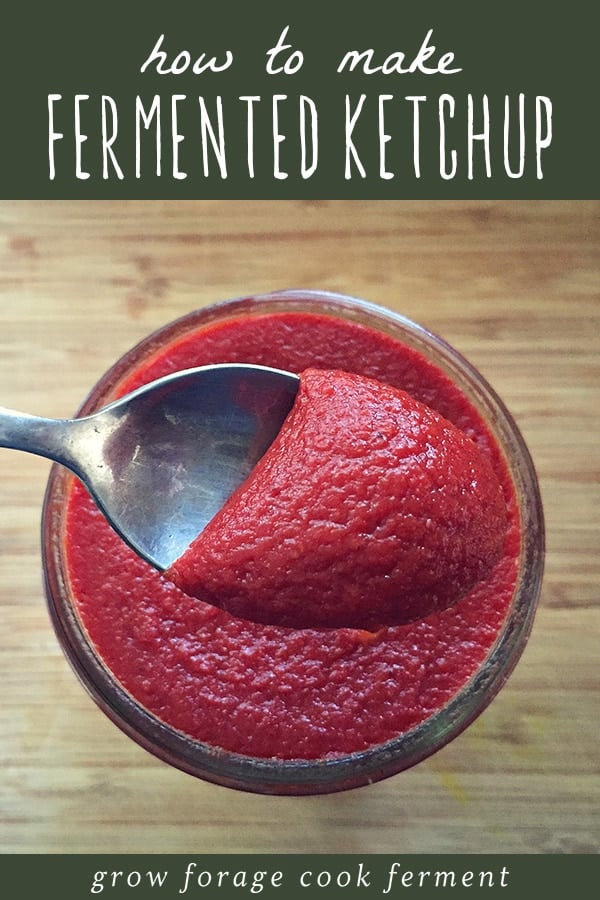
Want to save this post for later?
Ketchup History
Did you know that ketchup started out as a fermented fish sauce, often made with guts and entrails? Doesn’t sound too appetizing to me. But at least it was fermented!
It then somehow transformed into a mushroom sauce, usually made with wild mushrooms, with other variations made with walnuts. I still sometimes see recipes for mushroom ketchup, which sounds pretty tasty to me, so I may give that one a try someday.
Ketchup made with tomatoes didn’t start showing up until the late 1800’s, and was soon thereafter made and bottled commercially. This is pretty much how we’ve been eating ketchup for the past 150 years, from a bottle that was bought in a grocery store.
The unfortunate thing is that most ketchup is filled with sugar (often high fructose corn syrup) and other weird ingredients, and has also become a staple in many kids diets.
Even most organic ketchup has some kind of sugar in it, with the only exception that I’ve found is Primal Kitchen Unsweetened Ketchup (which is pretty good, I might add).
Commercially made ketchup has been passing as a “vegetable” for far too long!
Fermented Ketchup Recipe
I’m going to admit that I actually am not a ketchup lover, never really have been. No, not even on french fries. I prefer mustard over pretty much everything, particularly a spicy dijon.
This is probably why I haven’t made fermented ketchup until now. But, as you might remember from my no knead sourdough rye bread post, I’m on a mission to make a totally homemade Reuben sandwich.
This of course involves Russian dressing, which has ketchup as an ingredient. So, I decided to make this fermented version, which makes it tastier and a bit tangier, much more to my liking.
What you will need
To make this fermented ketchup, you will need to start with tomato paste, either home canned or store bought.
You will also need to use a bit of brine from another ferment to kick start the fermentation. This can be from fermented sauerkraut, dilly beans, cucumber pickles, cherry tomatoes, or another vegetable ferment.
Whey from making yogurt or cheese would also work!
To make the ketchup, mix the tomato paste, brine from another ferment, apple cider vinegar, honey, salt, and spices in a bowl.
And stir it all together. Don’t you like recipes like that?
This ketchup is actually pretty darn tasty just like this, but I find that fermenting it for just a few days makes it even better.
Put the mixture into a quart jar and top loosely with a lid. If you have a fermentation airlock system feel free to use it if you wish, but this is a fairly quick and easy ferment so I didn’t bother with it.
Put in a dark and quiet corner of your kitchen for 3-4 days, then store in the refrigerator. I transferred it into a pint jar, and it was filled exactly to the brim. You can leave it in the quart jar if you want, though.
I am really pleased with how this ketchup turned out! I used the brine from my fermented dilly beans, which it gave it a slight dill pickle flavor that I totally love.
This ketchup can be used just like you would normally, french fries and all.
I made some sweet potato and parsnip fries that paired deliciously with this ketchup! I didn’t even miss my usual dijon mustard. Yum!
Now I am one step closer to that Reuben sandwich! Plus I have another healthy homemade condiment in my arsenal. Can’t beat that!
Homemade Fermented Condiment Recipes
Learn how easy and delicious it is to make your own fermented condiments and sauces!
Fermented Ketchup Recipe
Ingredients
- 3 6 oz cans tomato paste
- ¼ cup brine from another ferment or whey
- 3 Tbsp raw apple cider vinegar
- 1-2 Tbsp raw honey
- 1 tsp kosher, pickling, or sea salt not iodized
- 1 tsp garlic powder
- ½ tsp mustard powder
- ¼ tsp ground allspice
- ¼ tsp fish sauce
Instructions
- Combine all the ingredients in a mixing bowl and stir until well combined.
- Transfer the ketchup into a quart jar and place the lid on loosely. You can alternatively use a fermentation airlock system.
- Place the jar into a dark corner of your kitchen for 3-4 days to ferment. Once fermented, store in the refrigerator.
Notes
- Fermented ketchup should last for at least a few months in the refrigerator.


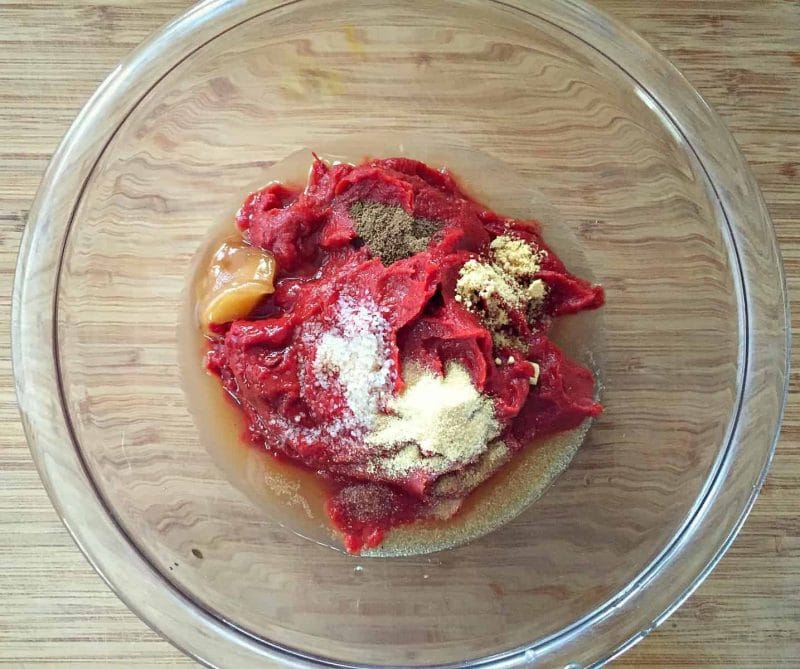
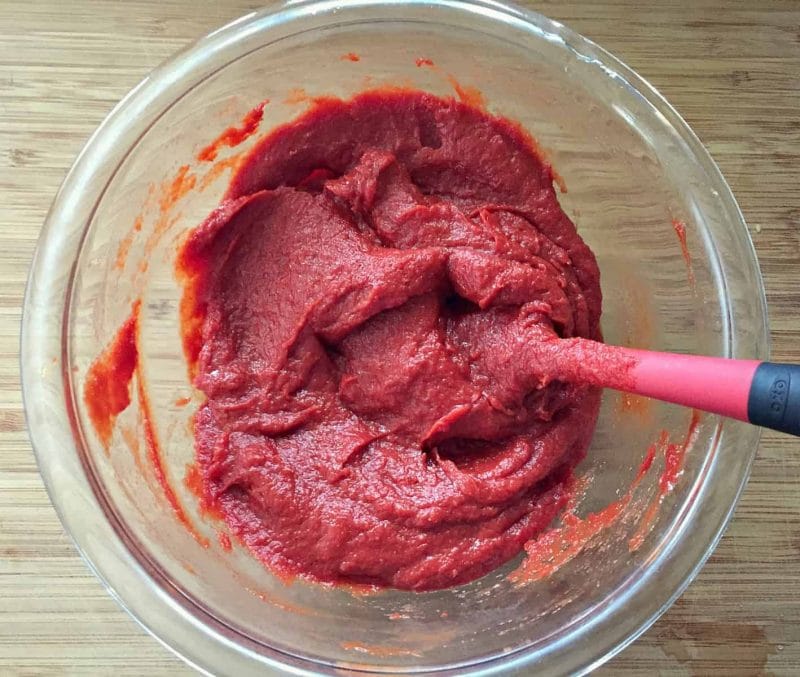
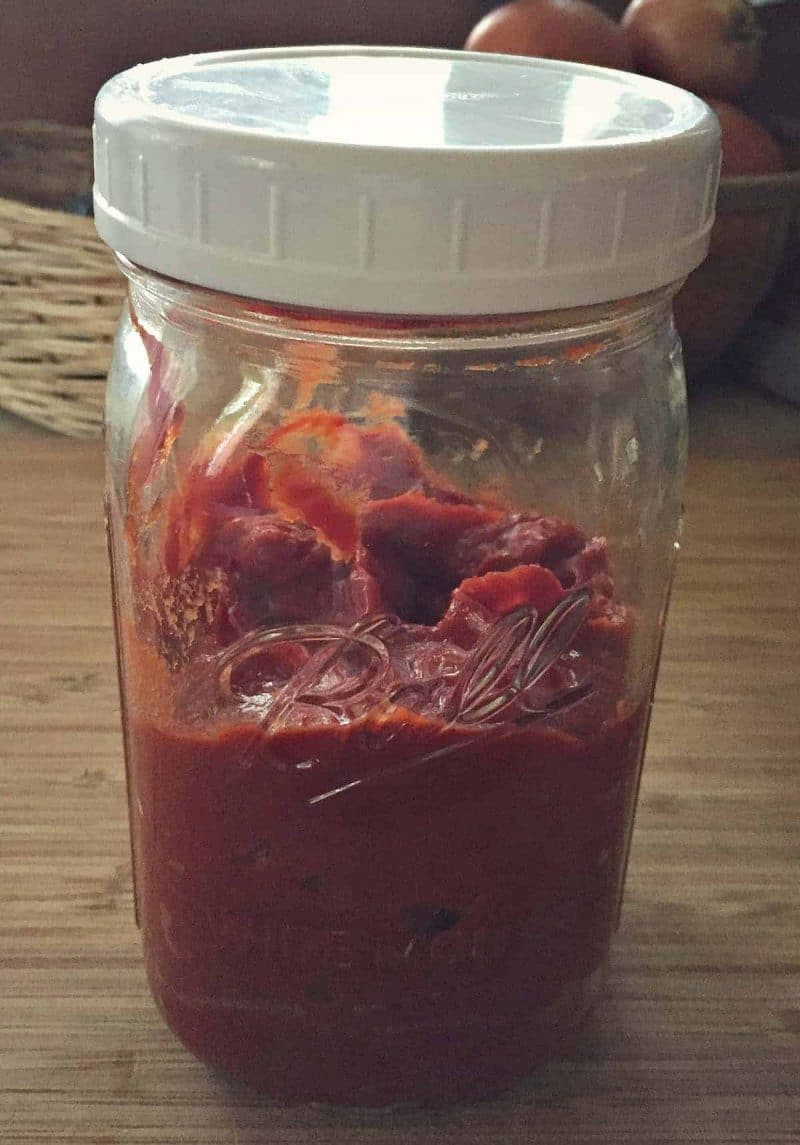
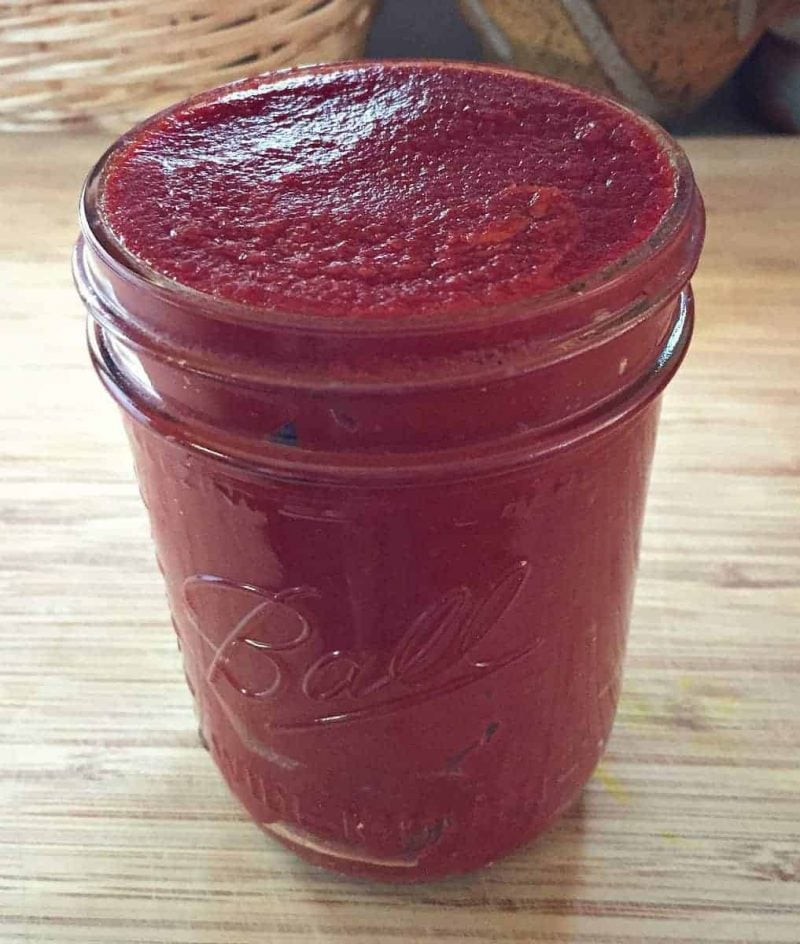
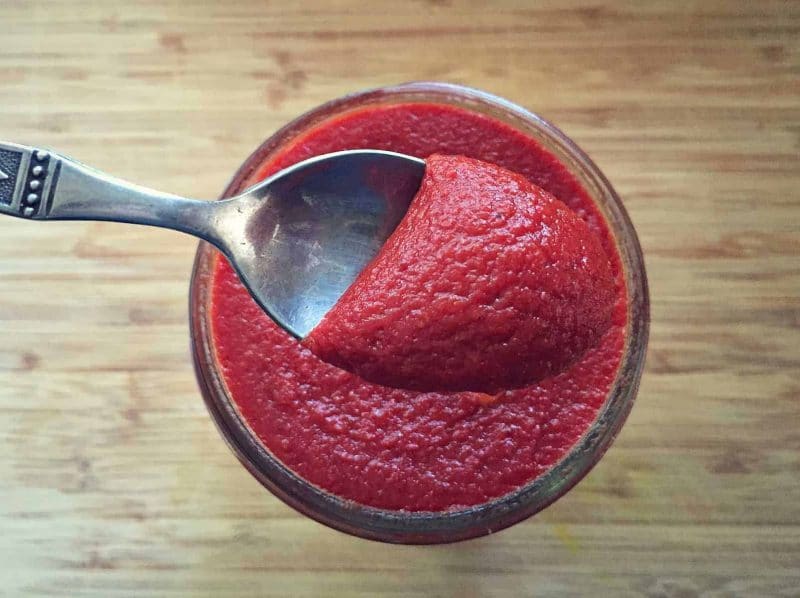
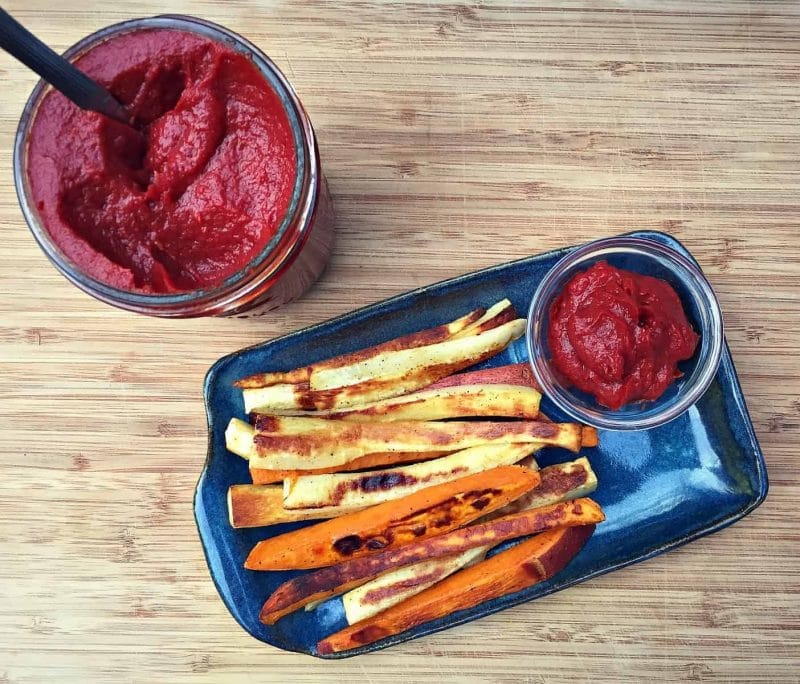

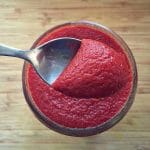

After this is fermented can it then be water bathed and sealed for long term storage?
I can’t speak to the ketchup in particular but I have fermented Sauerkraut. I made a huge batch that took me a year to finish off. It kept for a year in the fridge. Keep in mind that the lactobacteria and lactic acid they produce, prevent spoilage by harmful bacteria. Since they are your allies as a natural preservative, why kill them with heat? Also, those lactobacteria are PROBIOTICS, so again, why kill your gut buddies with heat? Fermentation is how humans preserved food since time immemorial. Don’t go modern and kill everything to have dead food.
Do you think lemon would work in place of the vinegar and if so would you put as much lemon in the recipe as vinegar – ?
I would start with 1.5 TBSP and adjust by taste up to 3 TBSP.
Good Morning
What kind of brine can I use? I’m not sure I have a “brine” here to use
Also, can I use something else in lieu of the fish sauce? My wife has allergies to preservatives of any kind, gluten,…and, thus, I have to prepare everything natural/organic….and I have never found a fish sauce she can have.
Thanks
You can omit the fish sauce if you like or replace it with coconut aminos. You’ll need some sort of fermented brine to kickstart the fermentation. The liquid in a jar of sauerkraut could work.
Hi Colleen, thanks for this recipe! I ferment a lot so thought this would be an easy one. Mine turned out quite fizzy – even though I only left it out 3 days. Is that normal? Did I add too much perhaps? Thank you!
Is there a substitution for the fish sauce or should I just leave it out?
Could I use beets instead of tomatoes? I have a sensitivity to tomatoes, I have missed ketchup.
I made this and used maple syrup instead of honey, it tastes great! I’m am pretty new to fermenting. When I made my fermented pickles, they started to fizz during the fermentation process. This ketchup did not do that. Does that mean it did not ferment? I left it in our pantry for 3 days.
I made this wonderful ketchup and also use it as pizza sauce. I added Italian Spice to it and it was perfect.
Hi, I have no brine from a previous ferment and no whey from kefir, is there anything else I could use in place of these? Thanks
If you have kombucha or water kefir that would also work. Unfortunately the ketchup won’t ferment with some kind of starter brine, so if you don’t have anything at home I would see if you can buy some kombucha or naturally fermented pickles (Bubbies brand will work) and use the brine from that.
Is the honey or other sweetener necessary for the fermenting process? I know in kefir the bacteria uses the sugar in the milk for food but I had no sugar in my fermented carrots. I am just a beginner to fermenting. I’d like to use another sweetener source like Stevia.
The sugar helps it to ferment but isn’t completely necessary. Stevia will not do anything for the fermentation, but it will add some sweetness.
Hi Colleen, I use maple syrup instead of honey, it adds a great depth of flavor.
Do you think I could freeze it? I am excited to make it with fresh heirloom tomatoes…
I think you probably could, but I’ve never tried it so I don’t know for sure.
My 9 yr old and I just made this using a Jun tea kombucha vinegar in place of the brine and ACV. It’s delicious and so easy to make! Thanks for the recipe!
I am so curious how this would taste! I am absolutely obsessed with ketchup but havn’t thought of altering it in any way. Your comments about how ketchup is usually made with lots of sugar or high fructose corn syrup is so right. Its quite sad actually, ketchup doesn’t have to be something so sweet and bad for you – its made from tomatoes! When I buy ketchup from the store I do my best to go organic with annie’s or get the heinz version that doesn’t have HFCS in it. Thanks for sharing this recipe! I’m very curious to see how fermented ketchup tastes.
May I ask. Why uniodized salt?
Iodized salt interferes with the fermentation process, so it’s always best to use kosher or sea salt.
This is awesome. I’ve been wanting a recipe to get my children off the dreaded ketchup. Not that they have it much. Just checking, I live in a really hot climate, and it is summer here (in Australia) should I only leave it for a couple of days? I find leffi only takes a day. My kitchen is always 85 degrees
Hi. I live in NZ, and our summers in the North Island can be atrociously hot, and my Mum lives in Queensland. With fermented veggies, I leave them out for maybe a day, then I put them in the “fermenting fridge”. It is an old fridge that I keep out in the garage, and run at around 8 – 10 C, instead of the usual 2 – 4 C that a kitchen fridge runs at. I use it for storing fermenting veggies, second fermenting water kefir and cider, and aging cheeses. 8 – 10 C is the perfect temp for a nice slow-ish ferment.
If you add the cider vinegar to this recipe would it not be considered pickled instead of fermented? I’m asking because I’m new to fermenting of vegetables.
Raw apple cider vinegar is actually a fermented food, so it wouldn’t be pickled. Vinegar pickles are usually canned, also, which kills off all of the beneficial bacteria. They are still delicious, though!
Id like to make this. Could I use kombucha for the brine? I also make my own cider vinegar.
If I wanted to thin it down a bit would I use more brine or just use water like I would any other ferment?
You could probably do either one, but the brine will add more saltiness.
The lid on your jar , where did you find them? Thank you
They are plastic storage lids made by Ball. I’ve found them in the canning section of many stores, or you can also find them on Amazon here: http://amzn.to/2cYLOnc
I’ve been searching for a recipe that doesn’t use whey for weeks! And BONUS, I’ve learned something, I can sub brine for whey, in all those yummy looking recipes that call for whey, from now on. I do however, feel a little slow, and excited, all at the same time. Thank you!
I’ll be making this today, without the honey (I don’t consume any sugar) and I’m wondering, since it’s fermented, can’t I just store it in my cupboard?
So glad you found the recipe, it really is a good one! If you store it in your cupboard it will continue to ferment, and could eventually start to go bad. Keeping it in the fridge will slow the fermentation process down, and it should keep for many months.
The honey is used as food for the microbes so that fermentation takes place. Once fermented the sugar has already been processed by the bacteria. This will not have much sugar content if fully fermented. You must refrigerate after fermentation however to preserve it.
Between the salt and the ferment brine, honey doesn’t sound necessary. It sounds like Colleen is making certain beyond a doubt that her ketchup doesn’t mold. If the tomatoes were ripe, they’d have plenty of sugar. And as stated elsewhere you can add stevia or monkfruit for sweetener.
How long will this ketchup last in the fridge?
Probably quite a while given that it’s fermented. I’m not totally sure, but I’ve had mine in the fridge for a couple of months and it’s still just fine! Just watch for mold and weird smells and you should be ok.
I think this one will be a keeper and thanks for making it using canned stuff! It is hard and time consuming sometimes to do everything from the garden or the market.
Colleen, as someone somewhat familiar with fermentation, I’d like to ask why you add vinegar to the recipe? Between the salt, ferment brine and fish sauce, you should have more than enough salt. And the ferment brine should have more than enough lactobacteria, right? So is vinegar necessary or do you include it for taste?
It’s for taste, but please omit it if you prefer.
This looks yummy. As I was writing it down I realized I could make this even easier by just using fire cider that I have already made. I can’t wait to try it.
this ketchup sounds like something I will try. My wife and I grow and can several types of tomatoes including some yellow varieties. It would be fun to serve yellow ketchup to our friends.